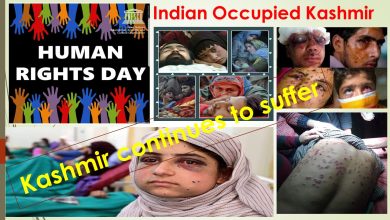Kashmir Black Day: A Reflection on 27th October 1947
 October 27, 1947, marks a pivotal moment in the history of Kashmir, a day that has since been commemorated as Kashmir Black Day. On this day Indian government send its troops to Jammu and Kashmir against the will of the Kashmiri people. This date signifies the beginning of a prolonged struggle against illegal occupation by Indian forces. Each year, Kashmiris and their supporters worldwide observe this day to express solidarity with the people of Indian illegally occupied Jammu and Kashmir who have endured decades of turmoil, oppression, and human rights violations.
October 27, 1947, marks a pivotal moment in the history of Kashmir, a day that has since been commemorated as Kashmir Black Day. On this day Indian government send its troops to Jammu and Kashmir against the will of the Kashmiri people. This date signifies the beginning of a prolonged struggle against illegal occupation by Indian forces. Each year, Kashmiris and their supporters worldwide observe this day to express solidarity with the people of Indian illegally occupied Jammu and Kashmir who have endured decades of turmoil, oppression, and human rights violations.
The Historical Context
The roots of the Kashmir conflict can be traced back to the partition of British India in 1947, which resulted in the creation of two independent states: India and Pakistan. The princely states were granted the autonomy to join either nation. Maharaja Hari Singh, the Hindu ruler of the Muslim-majority state of Jammu and Kashmir, initially opted for independence. However, later on the basis of what is believed as controversial and non-existent instrument of accession, India send troops to Kashmir on October 27.
This accession is contested; critics argue that it was signed under duress and without the consent of the Kashmiri people. The subsequent arrival of Indian troops marked the beginning of an occupation that has lasted over seven decades. India took the matter to United Nations, and UNSC after listening to India and Pakistan, established that people of Kashmir will decide its political future through a free and fair plebiscite that remains unfulfilled till date.
The Human Cost
The human cost of this conflict is staggering. Since 1947, over four lac people have lost their lives due to violence, military operations, and human rights abuses perpetrated by Indian occupation forces and Hindu extremists. Reports document extrajudicial killings, enforced disappearances, torture, and sexual violence against civilians. The region is often described as one of the most militarized zones in the world, with approximately one million Indian soldiers stationed there.
The situation escalated dramatically on August 5, 2019, when India revoked the special status granted to Jammu and Kashmir under Article 370 of its Constitution. This move was met with widespread condemnation and further fueled tensions in an already volatile region. It also intensified fears among Kashmiris about demographic changes aimed at altering the region’s Muslim-majority status through change is state subject laws.
Observing Black Day
Kashmir Black Day serves as a reminder not only for Kashmiris but also for the international community about the ongoing suffering faced by those living under occupation. On this day, protests are held globally to raise awareness about human rights violations in Indian occupied Jammu and Kashmir. Activists distribute literature detailing these abuses and call for international intervention to uphold the rights of Kashmiris. In Pakistan, government officials and citizens alike participate in rallies and demonstrations to express solidarity with their Kashmiri brethren. The day is marked by speeches from political leaders reiterating their commitment to supporting Kashmiris in their quest for self-determination.
A Call for Global Attention
Despite numerous United Nations resolutions advocating for a plebiscite in Kashmir, international attention has waned over the years. The ongoing human rights violations have often been overshadowed by geopolitical interests and regional stability concerns. This neglect highlights a broader failure within international systems designed to protect human rights and uphold justice.
The plight of Kashmiris is emblematic of larger global issues where powerful nations act with impunity while weaker populations suffer under occupation. As we observe Kashmir Black Day this year, it is imperative that we reflect on our collective responsibility to advocate for justice and support those whose voices are silenced by oppression.
Conclusion
Kashmir Black Day is not merely a commemoration; it is a call to action for all who believe in justice and human rights. It reminds us that the struggle for self-determination is ongoing and that we must not turn a blind eye to the suffering endured by millions. As we remember October 27, 1947, let us stand in solidarity with the people of Jammu and Kashmir and demand an end to their suffering.
The hope remains that one day soon, the aspirations of Kashmiris for peace and self-determination will be realized, allowing them to live freely in their homeland without fear or oppression. Until then, October 27 will continue to resonate as a stark reminder of both historical injustices and ongoing struggles for freedom across the globe.
 Writer Nida Awais is student of Peace and Conflict Studies at National Defence University and intern at Kashmir Institute of International Relations.
Writer Nida Awais is student of Peace and Conflict Studies at National Defence University and intern at Kashmir Institute of International Relations.








